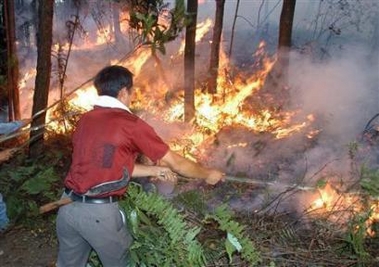Beijing - The worst drought to hit southwest China in more than a century is
spreading to neighbouring provinces with temperatures reaching record highs,
state media said on Friday.
The densely populated municipality of Chongqing and eastern parts of Sichuan
province have been plagued by repeated heatwaves and have seen no significant
rainfall since early July.

A resident helps to extinguish a forest fire in southwest
China's Chongqing municipality, August 31, 2006. [China
Daily] |
The drought is the worst since 1891 when meteorological records began in
Chongqing, now hosting a population of 30 million, and had brought direct
economic losses totaling 6.5 billion yuan (US$817 million), Xinhua said.
Heat and drought had also hit the neighbouring province of Guizhou, the
eastern provinces of Zhejiang, Anhui and Jiangxi, and the central provinces of
Hunan and Hubei, Xinhua said.
Temperatures of up to 42.4 degrees Celsius (108.3 degrees Fahrenheit) were
recorded in Chongqing on Thursday, after a high of 43.4 C on Wednesday.
Chongqing city, the industrial heart of the municipality with a population of
12 million, reported a record high of 44.5 C on August 16.
Some 18 million people have been short of drinking water and 11 million
hectares of crops, mostly rice but including corn and tobacco, have been
destroyed or damaged, Xinhua news agency said.
"The drought is a rarity in history in terms of the time it has lasted, its
extent and the huge damage it has caused," Xinhua quoted the top drought relief
official, Er Jingping, as saying.
No deaths have been reported.
More than 4,000 people have been fighting a forest blaze that had ravaged
parched timber since Wednesday in the north of Chongqing, which reported 97
forest fires in August, Xinhua said.
The impact has been broad. Crop production is down and vegetable prices are
soaring.
But millions of schoolchildren and teachers have seen the start of term
postponed due to the latest heatwave which is expected to last at least until
Monday.
Authorities had successfully prevented farmers clashing over water, either
for drinking or irrigation, Xinhua said.
Some coal traders, trying to profit from the disaster, have sold coal
adulterated with anything from pebbles to limestone to power plants as prices
rise.
"Generators were seriously damaged and kept having to halt operation,
worsening the already strained electricity supply," Xinhua quoted a local
official as saying.
China's east and southeast have already been repeatedly battered by typhoons
and floods this summer, killing more than 1,000 people.